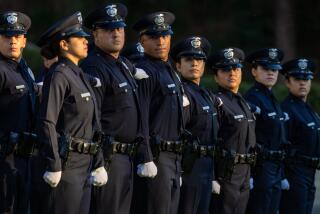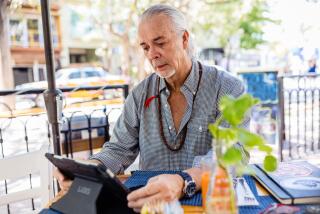Joint forces lack a key weapon: trust
- Share via
JOINT SECURITY STATION SULAKH, IRAQ — The U.S. military command center inside this cramped Iraqi police station is off-limits to Iraqi police. A Humvee and two U.S. soldiers block access to the American side.
The barricaded police post in northwest Baghdad is called a joint security station, the latest U.S. effort at teaming American soldiers with Iraqi police to battle insurgents and militiamen. But at least for now, the station is literally split down the middle.
“We don’t trust ‘em,” 1st Lt. Steve Taylor said of his Iraqi police counterparts. “There’s no way to know who’s good and who’s bad, so we have to assume they’re all bad, unfortunately.”
The station’s fortified rooftop flies an Iraqi flag, but no Iraqis are allowed there. It’s restricted to American soldiers, who maintain a 24-hour watch over the adjoining neighborhood. With one eye, they watch for insurgents and militiamen. With the other, they watch their supposed allies, the police.
Since U.S. forces invaded Iraq four years ago, training and bolstering the Iraqi police and army have been central to the strategy for gradually withdrawing American units. But the U.S. military is only now fully embedding its forces with Iraqi police in local neighborhoods -- and as the Sulakh station shows, the effort is daunting.
There will be no trust between U.S. soldiers and Iraqi police until the Iraqi government fulfills its promise to root out the Shiite Muslim militiamen who dominate the force. From the top ranks of the Interior Ministry, which controls the police, to ordinary officers, the force is riddled with members of militias notorious for killing Sunni Arab civilians and mutilating the corpses.
At the same time, the police and Shiite civilians are targeted by Sunni insurgents, who kill dozens at a time in mammoth explosions.
“I’ve lost a lot of men,” said Col. Ali Mohammed Rahim, the Sulakh station commander, who leads a mostly Shiite force. “Snipers, [improvised explosive devices], kidnappings, murders -- all because they are Iraqi police. We are all targets. I am very worried.”
On a wall outside Rahim’s office are color portraits of slain officers. “Martyrs,” said a colleague, gesturing toward the photos and shaking his head.
Rahim said he worried about being killed on his 20-minute commute to work. He has moved his wife and family to live with relatives in an area where no one knows he works for the police.
His station is in the Adhamiya district of Baghdad, whose residents are a mix of Shiites and Sunnis, with a smattering of Kurds.
At least 15 joint security stations have been set up since U.S. and Iraqi authorities launched a major security crackdown in Baghdad last month. A total of about 30 are to be established in coming weeks, said Army Maj. Gen. William B. Caldwell IV, the top U.S. military spokesman in Iraq.
Until recently, almost all U.S. forces in Iraq lived on massive forward operating bases, or FOBs, venturing out for vehicle patrols but then returning to base. Many of the 21,500 additional troops now being deployed to Baghdad and western Iraq will live with Iraqi police in joint security stations and with Iraqi army troops in combat outposts, a belated acknowledgment that effective counterinsurgency tactics require working hand in hand in neighborhoods with security forces to win the confidence of the civilians there.
Rahim was an army officer during Saddam Hussein’s regime. Until last month, he had never worked with U.S. forces -- and American troops had never entered his precinct.
His area is a dumping ground for mutilated corpses, he said. But since the so-called U.S. surge troops moved into his station last month, he said, the number has dropped from 10 a day to 10 a week.
“The people feel safer with American forces here,” Rahim said. “Since the Americans are living here now, people feel like the U.S. wants to help, finally.”
Capt. Tim Marzano, who commands 66 U.S. soldiers at the station, said he was working to “develop a baseline trust” with Rahim and his officers, though Rahim complained that he had only 80 of the 200 officers he had been promised.
“I believe the majority of them are either neutral or pro-coalition, and we have to work on gaining confidence so eventually they can function on their own,” Marzano said.
For U.S. soldiers, the station offers bare-bones living. On the FOBs, troops have bountiful hot food at the mess hall, satellite TV, Internet cafes, flush toilets and hot showers. At Sulakh, they use plywood outhouses and eat packaged meals.
Taylor said he expected insurgents to attack the station with car bombs or rocket-propelled grenades. At least three joint security stations have been besieged, with U.S. forces and Iraqi police suffering casualties.
“We know an attack is going to come, but we can defend ourselves, believe me,” Taylor said. He cited the station’s reinforced concrete barriers and protective glass, plus heavy weapons, air support and an on-call quickreaction force.
Despite the threats and hardships, several paratroopers in the unit -- the 2nd Battalion, 319th Airborne Field Artillery Regiment of the 82nd Airborne Division -- said they preferred hitting the streets to sitting in distant FOBs.
“You’re going to be away from your family anyway, so you might as well jump into the thick of it,” said Spc. Brandon Webb, 25. “We’re soldiers. We need to be close to the fight.”
Late one night, a U.S. patrol of 22 paratroopers walked through the neighborhood, seeking out Iraqi civilians willing to offer information. Because of the 8 p.m-to-6 a.m. curfew, they reasoned, people in their homes might be willing to talk because they were unlikely to be seen by their neighbors.
As the patrol turned a corner, three men approached. They complained that insurgents were paying neighborhood children to plant bombs and transmit messages. They said the insurgents planned their strategy at a shop inside the Fish Market, a nearby bazaar.
“We want you to kill these men,” one of them told Lt. Josh Rowan, the patrol commander.
“Now you’re talking!” Rowan said.
He asked the men if they were willing to put on disguises and accompany U.S. soldiers to point out the shop. They agreed.
“Going out on foot at night is the only way to get guys like that to talk to you,” Rowan said. “Otherwise they’re too afraid.”
The next day, soldiers from the station embarked on their first foot patrol with Iraqi police. Six police officers toting AK-47 automatic rifles took the lead, followed by 26 Americans in full combat gear. They walked across cracked concrete and past trash piles, drawing stares and a few waves from residents in tea shops and doorways.
A mosque loudspeaker was blaring the Muslim call to prayer when Taylor knocked on the door of a house. A middle-aged man in a dishdasha robe invited him into his diwaniya, or reception room, where he and Taylor discussed the local security situation through a masked interpreter named Phillip.
The resident, who declined to give his name, said that the neighborhood was relatively safe but that the Fish Market was terrorized by gunmen.
“We’re here to help you,” Taylor said. “We just want peace and quiet.”
The man nodded. “We do, too, inshallah [God willing].”
At another house, the patrol encountered a sedan pocked with bullet holes. There was dried blood on the back seat.
As the Iraqi police officers listened in, a man named Mohammed told the soldiers the blood was from a family member killed by insurgents three weeks before at an illegal checkpoint.
After the police moved on, Mohammed approached an American reporter walking with the patrol and said in English: “Nobody will tell you anything with the police along. Nobody trusts them. They are thieves and killers.”
Recruiting and training officers untainted by militia connections is crucial to building a competent and trustworthy force. One afternoon, Lt. Col. Wilson Shoffner, who commands the paratroopers at the Sulakh station, visited a nearby Iraqi police academy. There he listened to a litany of complaints from the new commander, Brig. Gen. Abdul Kareem Hisnamy.
He was supposed to have 111 staff officers, the general said. He had four. He couldn’t keep the electricity on or the water flowing. His cadets had to bring mattresses and blankets from home. He was supposed to have 800 cadets. He had 524. He needed better weapons, more protective concrete barriers, more vehicles. Humvees would be nice, he said.
Nor did he have enough noncommissioned officers. “I don’t trust them anyway,” Hisnamy said. “They’re not smart.”
Shoffner asked how he ensured that militiamen weren’t infiltrating the academy. The general, a small, round man with a bushy black mustache, sighed.
“I’m constantly thinking about whether this guy or that guy is militia,” he said. “All my efforts go just for security.”
Shoffner was heartened by the general’s plan to vet all recruits, and by his goal of sending graduates out as a unit rather than as individuals stationed in their home areas. The colonel and the general agreed that sending police back home only encouraged renewed links to local militias.
The two men’s mutual mission seemed weighted down by endless obstacles.
“How do you say ‘problem’ in Arabic?” Shoffner asked his interpreter.
“Mushkilia.”
“We should probably learn that,” the colonel said.
Zucchino was recently on assignment in Baghdad.
More to Read
Sign up for Essential California
The most important California stories and recommendations in your inbox every morning.
You may occasionally receive promotional content from the Los Angeles Times.













